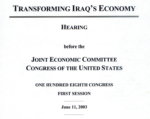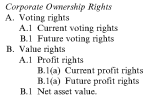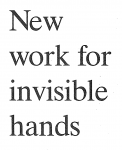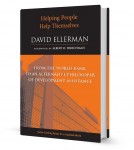This is my testimony to the Joint Economic Committee of Congress in 2003 making recommendations after the U.S. conquered Iraq and had to figure out what to do. Today, it can be read as a negative-blueprint since the U.S. seems to have done just the opposite on every count.
Autonomy-Respecting Assistance
This paper, written upon request for the UNDP volume on Capacity for Development and in time for a big conference in Mexico on the topic, is a good brief summary of my then forthcoming book, Helping People Help Themselves –even if I was screwed out of a sizable honorarium by one of the editors, Malik.
Parallel Experimentation
The theme of parallel experimentation is used to recast and pull together dynamic and pluralistic theories in economics, political theory, philosophy of science, and social learning.
Three Themes about the Mondragon cooperatives
This is a preprint of a paper developing three themes, capital structure, active learning, and spinoffs, with special attention to the Mondragon cooperatives.
Making Enterprises and Markets Responsible
This is a paper written to further Richard Cornuelle’s abiding vision of a more responsible economy and posted here to invite comment. The basic idea is revisit the whole idea of a market economy dominated by absentee-owned and publicly traded corporations (“Wall Street Capitalism”) that disconnect companies (“the Mother of all disconnects”) from the natural desires of the people working in the companies to improve their communities.
Revisiting Hirschman
This paper revisits the seminal early work of the late Albert Hirschman on development strategy and his critique of the “big push” strategies in order to elucidate the current debates about conditionality-based aid and comprehensive development programs.
The Two Institutional Logics
This paper, published in a Korean English-language journal, argued for the logic of commitment in the design of a firm rather than the logic of exit. The contrasts between these two logics is explored in many fields.









